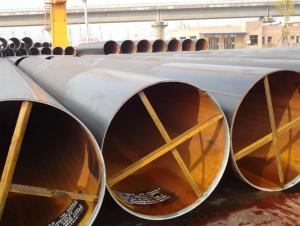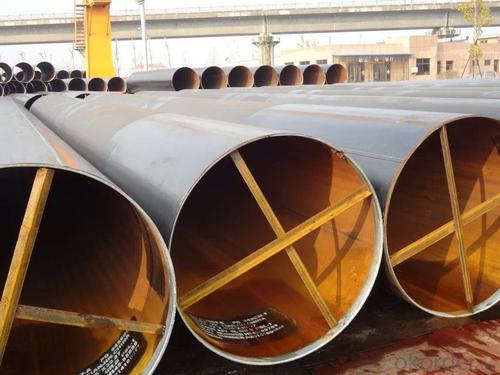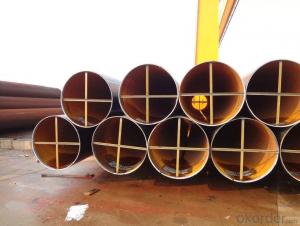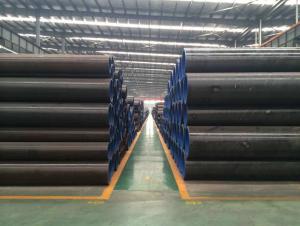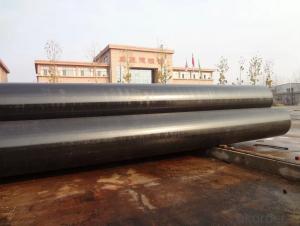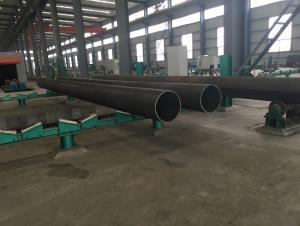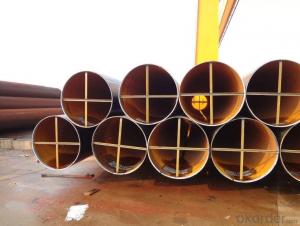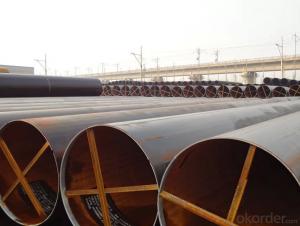Large diameter longitudinal submerged arc welded pipe for selling
- Loading Port:
- Tianjin
- Payment Terms:
- TT or LC
- Min Order Qty:
- 30 m.t.
- Supply Capability:
- 9000 m.t./month
OKorder Service Pledge
OKorder Financial Service
You Might Also Like
Product Description:
1、Structure of Welded Steel Tube:
Welded Steel Tube is formed by drawing a solid billet over a piercing rod to create the hollow shell. We are company that have many years experience and professional manager team and engineer team and sales team, sure we will provide you high quality of welded pipe and professioanl service.
2、Main Features of the Welded Steel Tube:
• High manufacturing accuracy
• The higher strength
• The small inertia resistance
• Strong heat dissipation ability
• Good visual effect
• Satisfy price
3、Welded Steel Tube Specification:
Standard | Grade | (MPa) | (MPa) | ||
Yield strength | Tensile Strength | ||||
API SPEC 5L | PSL1 | ||||
B | ≥241 | ≥414 | |||
×42 | ≥290 | ≥414 | |||
×46 | ≥317 | ≥434 | |||
×52 | ≥359 | ≥455 | |||
×56 | ≥386 | ≥490 | |||
×60 | ≥414 | ≥517 | |||
×65 | ≥448 | ≥531 | |||
×70 | ≥483 | ≥565 | |||
PSL2 | |||||
| Min | Max | Min | Max | |
B | 241 | 448 | 441 | 758 | |
×42 | 290 | 496 | 414 | 758 | |
×46 | 317 | 524 | 434 | 758 | |
×52 | 359 | 531 | 455 | 758 | |
×56 | 386 | 544 | 490 | 758 | |
×60 | 414 | 565 | 517 | 758 | |
×65 | 448 | 600 | 531 | 758 | |
×70 | 483 | 621 | 565 | 758 | |
Chemical Composition(%)
Standard | Grade | C | Mn | P | S | CEV |
Max | Max | Max | Max | Max | ||
PSL1 |
- | |||||
B | 0.26 | 1.2 | 0.030 | 0.030 | ||
×42 | 0.26 | 1.3 | 0.030 | 0.030 | ||
×46,×52,×56,X60 | 0.26 | 1.4 | 0.030 | 0.030 | ||
X65 | 0.26 | 1.45 | 0.030 | 0.030 | ||
X70 | 0.26 | 1.65 | 0.030 | 0.030 | ||
PSL2 |
0.43 | |||||
B | 0.22 | 1.20 | 0.025 | 0.015 | ||
1) Material: Grade:API 5L GR.B, X40, X42, X52, X56, X60, X65, X70.ST37/37-2,ST33,ST35.8,ST35.4.GB 9711.1/SY5037/GB3092
2) Specification range: OD: 406.4MM-1422MM (16”-56”)
Thickness: 8MM-50.8MM depends on OD
3) Excutive standards:GB,ASME API5L.ASTM A 106/A53,Despite of the above standards,we can also supply seamless steel pipe with standard of DIN,JIS,and so on,and also develop new products according to the requirements of our clients!
4) Surface:black lacquered,varnish coating or galvanized.
5) Ends:Beveled or square cut,plastic capped,painted.
6) Packing:bundles wrapped with strong steel strip,seaworthy packing.
4、Packaging & Delivery
Packaging Details: | seaworthy package,bundles wrapped with strong steel strip |
Delivery Detail: | 15-30days after received 30%TT |
5、FAQ of Welded Steel Tube:
①How is the quality of your products?
We have many years business experience in this area, and we have professional engineer and manager team and sure we can provide you high quality production and professional service.
②How about price?
If you like bargain and factory price is not low enough as you think, just don’t waste your time.Please trust the quotation we would give you, it is professional one.
③Why should you chose us?
We can give you both.Additionally, we can also offer professional products inquiry, products knowledge train(for agents), smooth goods delivery, exellent customer solution proposals.Our service formula: good quality+good price+good service=customer’s trust.
6、 Welded Steel Tube Images:
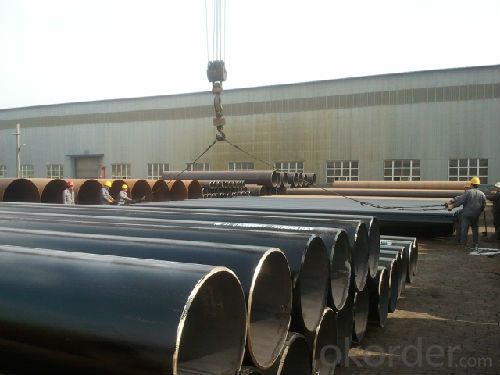
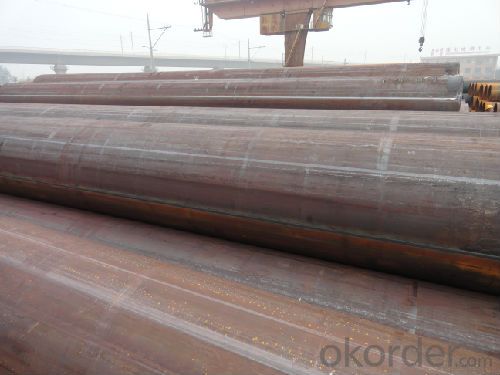
- Q: What is the theoretical weight per square meter of the steel pipe diameter of the outer frame and the thickness of the tube wall 3mm 48mm?
- The outer steel tube diameter is 48mm, the tube wall thickness is 3mm, the theoretical weight per meter is 3.3291kgCalculation formula: (outside diameter wall thickness) * wall thickness *0.02466(48-3) *3*0.02466=3.3291kg
- Q: Does the seamless steel pipe need rust removal?
- Chemical and electrolytic methods are generally used for pickling treatment. The pipeline corrosion only uses chemical pickling, which can remove oxide, rust and old coating. Sometimes, it can be treated as sand blasting after rust removing. Two. Although chemical cleaning can make the surface reach a certain degree of cleanliness and roughness, but its anchor grain is shallow, and easy to pollute the environment.
- Q: What is the role of steel pipes in the mining and extraction of minerals?
- Steel pipes play a critical role in the mining and extraction of minerals as they are used for various applications throughout the process. These durable pipes are commonly employed to transport and distribute water, chemicals, and compressed air to different areas of the mine. Additionally, steel pipes are utilized in the construction of mine shafts, tunnels, and underground structures, providing stability and support. Their ability to withstand harsh conditions, resistance to corrosion, and high strength make steel pipes an indispensable component in the mining industry.
- Q: What are the common sizes of steel pipes?
- The common sizes of steel pipes vary widely, but some common diameters range from 1/8 inch to 36 inches, with wall thicknesses typically ranging from Schedule 10 to Schedule 160.
- Q: How do steel pipes perform in extreme weather conditions?
- Steel pipes generally perform well in extreme weather conditions. They have high strength and durability, making them resistant to harsh weather elements such as extreme temperatures, heavy rainfall, and strong winds. The material's resistance to corrosion and rust also ensures that the pipes can withstand long-term exposure to moisture and other environmental factors. However, it is important to note that proper maintenance and protective coatings can further enhance their performance and lifespan in extreme weather conditions.
- Q: What's the difference between stainless steel seamless tube and stainless steel welded pipe?
- Stainless steel seamless steel tube is a kind of steel strip with hollow section and without seams.
- Q: What are the applications of steel pipes in the automotive industry?
- Steel pipes are commonly used in the automotive industry for various applications such as exhaust systems, fuel lines, and structural components. They offer excellent durability, corrosion resistance, and high tensile strength, making them ideal for carrying fluids and withstanding harsh environments. Additionally, steel pipes can be easily formed and welded, allowing for efficient manufacturing and assembly processes in the automotive sector.
- Q: What do you mean by "SC" in welded pipe SC200? What's the diameter of 200?
- 200 refers to the diameter of the pipe. Personally, you should be an electrical professional, but the electrical specialty rarely uses the 200 pipe diameter unless it is used when the buried cable passes the road;
- Q: How can seamless steel tubes be produced?
- Seamless steel tubes are made of ingots or billets made by piercing and are then made by hot rolling, cold rolling or cold casting. Seamless steel tube plays an important role in the steel tube industry of our country. According to incomplete statistics, China's existing seamless tube production enterprises about more than 240, seamless steel pipe units about more than 250 units, with an annual output capacity of about about 4500000 tons. From the caliber, 35% of phi 76, less than phi 159-650, accounting for 25%. From the species point of view, the general use of 1 million 900 thousand tons of pipe, accounting for 54%; oil pipe 760 thousand tons, accounting for 5.7%; hydraulic props, precision pipe 150 thousand tons, accounting for 4.3%; stainless steel pipe, bearing tube, automobile tube 50 thousand tons, accounting for 1.4%.
- Q: Can steel pipes be used for the construction of dams?
- Yes, steel pipes can be used for the construction of dams. Steel pipes are often used in dam construction for various purposes such as water intake and outlet structures, penstocks, and spillway gates. They offer durability, strength, and resistance to corrosion, making them suitable for withstanding the high pressures and harsh environments associated with dam construction.
Send your message to us
Large diameter longitudinal submerged arc welded pipe for selling
- Loading Port:
- Tianjin
- Payment Terms:
- TT or LC
- Min Order Qty:
- 30 m.t.
- Supply Capability:
- 9000 m.t./month
OKorder Service Pledge
OKorder Financial Service
Similar products
Hot products
Hot Searches
Related keywords
